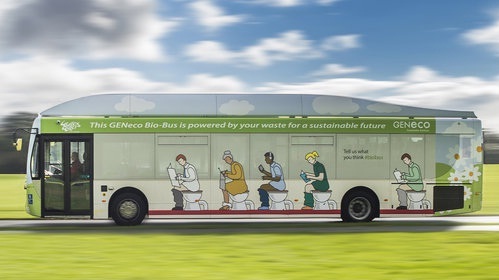A green, 40-seater bus powered entirely by biomethane from food and human wastes was launched in Britain. The Bio-Bus operating between the Bath and Bristol airport, travels for about 186 miles (300KM) on full tank of gas, which can be produced by the annual waste of five people.

The Bath Bus company, which operates the Eco-friendly poo bus, says that this has reduced carbon emissions as compared to the diesel powered buses.
The thought that you may be one of the contributors of wastes that produces power to this “Bio Bus”, sounds better right? Would either make you feel uneasy or rather curious on how the bus would smell in the event that smoke or odor will come out from the bus. But worry not because that will not happen.
This biomethane gas is produced through the treatment of food and human waste at the Bristol sewage treatment in Avonmouth which is operated by GENeco, a Wessex Water company.
According to Mohammad Saddiq, GENeco general manager, although vehicles powered by gas plays a vital role in the improvement of air quality within the cities in the whole of United Kingdom, the Bio bus aims to go further by being ‘fueled’ by the citizens living in the country and most probably even by the passengers riding on the bus as well.

Biomethane gas generation, storage and the Bio bus operation
– An annual food waste of a single person is enough run the Bio Bus for 37 miles.
– Notice the dome like container at the top of the Bio Bus? That is where the compressed gas is contained.
– Its combustion engine is similar in design to diesel equivalents in conventional buses
– In order to produce power, the Bio-methane goes into a boosting process, where carbon dioxide is eliminated while propane is being added The anaerobic digestion is used to produce the gas in which the biodegradable material is broken down by oxygen starved bacteria to produce the methane-riche biogas.
– The bio-methane gas produced is odor-free by removing contaminants.
Hello. impressive job. I did not anticipate this.